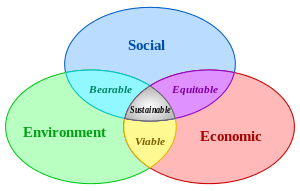Social ecology

 |
| Scheme of sustainable development: at the confluence of three constituent parts. (2006) |
| Part of the Politics series on |
| Communalism |
|---|
| Murray Bookchin |
| Concepts |
| Ideas |
| Related |
| Socialism portal |
| Part of a series on |
| Green politics |
|---|
.svg.png) |
|
Core topics |
|
Four Pillars |
|
Social Ecology is a critical social theory founded by American anarchist and libertarian socialist author Murray Bookchin. Conceptualized as a critique of current social, political, and anti-ecological trends, it espouses a reconstructive, ecological, communitarian, and ethical approach to society. This version advocates a reconstructive and transformative outlook on social and environmental issues, and promotes a directly democratic, confederal politics. As a body of ideas, social ecology envisions a moral economy that moves beyond scarcity and hierarchy, toward a world that reharmonizes human communities with the natural world, while celebrating diversity, creativity and freedom. Bookchin suggests that the roots of current ecological and social problems can be traced to hierarchical (or more specifically kyriarchical) modes of social organization. Social ecologists claim that the systemic issue of hierarchy cannot be resisted by individual actions alone such as ethical consumerism but must be addressed by more nuanced ethical thinking and collective activity grounded in radically democratic ideals. The complexity of relationships between people and nature is emphasized, along with the importance of establishing more mutualistic social structures that take account of this.[1]
Overview
Social ecology's social component comes from its position that nearly all of the world's ecological problems stem from social problems; with these social problems in turn arising from structures and relationships of dominating hierarchy. They argue that apart from those produced by natural catastrophes, the most serious ecological dislocations of the 20th and 21st centuries have as their cause economic, ethnic, cultural, and gender conflicts, among many others. Present ecological problems, social ecologists maintain, cannot be clearly understood, much less resolved, without resolutely dealing with problems within society.[2]
Social ecology is associated with the ideas and works of Murray Bookchin, who had written on such matters from the 1950s until his death, and, from the 1960s, had combined these issues with revolutionary social anarchism. His works include Post-Scarcity Anarchism (1971), Toward an Ecological Society (1980), and The Ecology of Freedom (1982).
Social ecology locates the roots of the ecological crisis firmly in relations of hierarchy and domination between people. In the framework of social ecology, "the very notion of the domination of nature by man stems from the very real domination of human by human."[3] While the domination of nature is seen as a product of domination within society, this domination only reaches crisis proportions under capitalism. In the words of Bookchin:
The notion that man must dominate nature emerges directly from the domination of man by man… But it was not until organic community relation … dissolved into market relationships that the planet itself was reduced to a resource for exploitation. This centuries-long tendency finds its most exacerbating development in modern capitalism. Owing to its inherently competitive nature, bourgeois society not only pits humans against each other, it also pits the mass of humanity against the natural world. Just as men are converted into commodities, so every aspect of nature is converted into a commodity, a resource to be manufactured and merchandised wantonly. … The plundering of the human spirit by the market place is paralleled by the plundering of the earth by capital[4]
While identifying himself within the anarchist tradition for most of his career, beginning in 1995, Bookchin became increasingly critical of anarchism, and in 1999 took a decisive stand against anarchist ideology. He had come to recognize social ecology as a genuinely new form of libertarian socialism, and positioned its politics firmly in the framework of a political ideology which he called Communalism.[5]
See also
- Biodiversity
- Conservation movement
- Conservation ethic
- Earth Science
- Ecology
- Environmental movement
- Global warming
- Natural environment
- Panarchy
- Polytely
- Recycling
- School of Social Ecology
- Sustainability
- Transition design
- Laudato si
- Bahá'í Faith
References
- ↑ Bookchin, Murray. The Ecology of Freedom: The Emergence and Dissolution of Hierarchy. Oakland: AK Press, 2005, p. 85-7.
- ↑ Bookchin, Murray. The Ecology of Freedom, p. 16.
- ↑ Bookchin, Murray. The Ecology of Freedom, p. 65.
- ↑ Bookchin, Murray. Post-Scarcity Anarchism. Oakland: AK Press, 2004, p. 24-5.
- ↑ Biehl, Janet, "Bookchin Breaks With Anarchism", Communalism, October 2007.
Further reading
- Bookchin, Murray (2004). Post-Scarcity Anarchism. Stirling: AK Press. ISBN 1-904859-06-2. OCLC 232006054.
- Bookchin, Murray (2005). The Ecology of Freedom. Stirling: AK Press. ISBN 1-904859-26-7.
- Light, Andrew (ed.) (1998). Social Ecology After Bookchin. New York: Guilford Press. ISBN 978-1-57230-379-9.
External links
- Institute for Social Ecology
- Transnational Institute of Social Ecology
- New Compass
- Libertarian Communist Library Murray Bookchin holdings
- Social Ecology London English study/action group exploring the philosophy of social ecology.